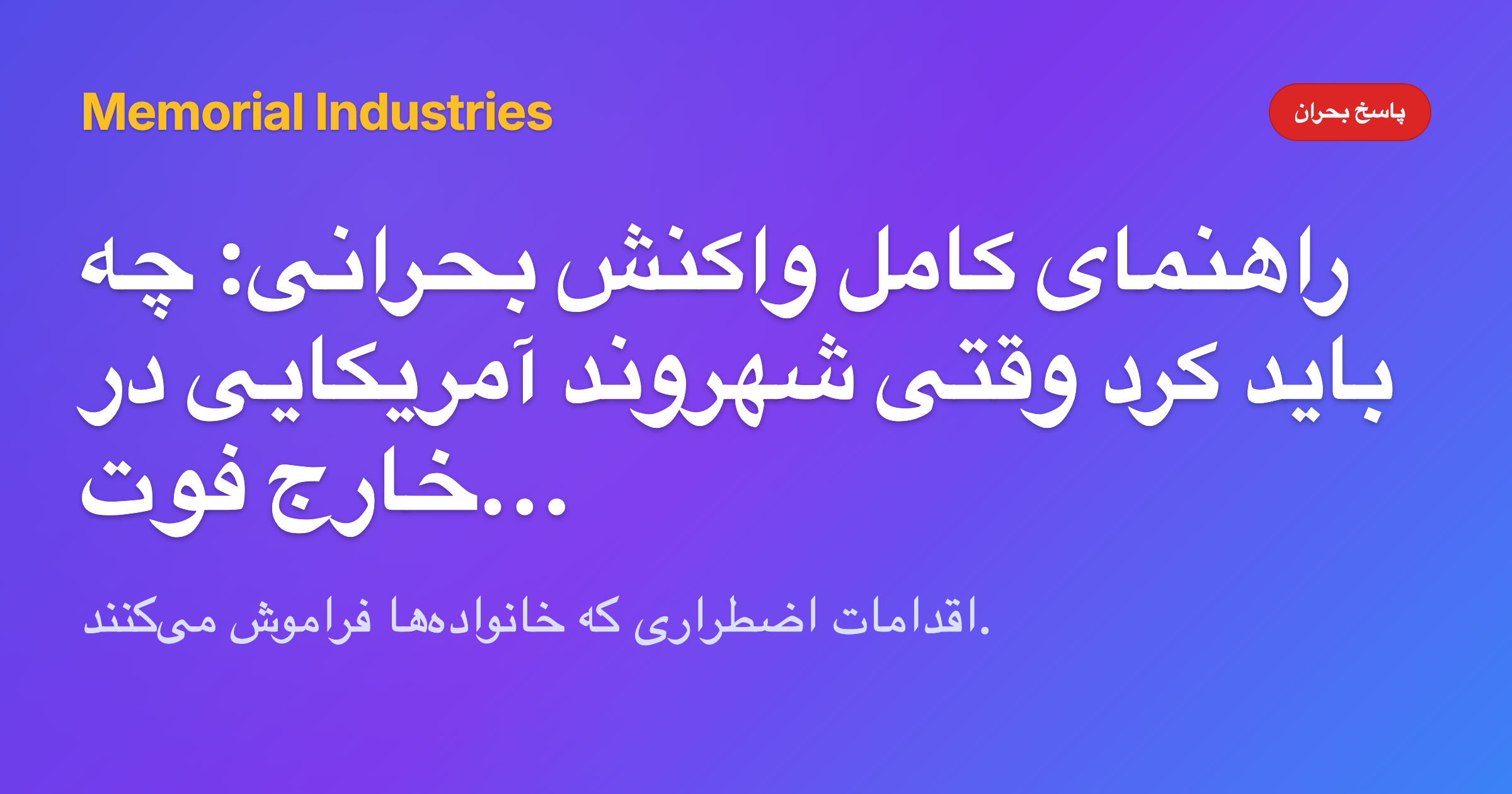
- Jan 28, 2025
- 7 min read
هزینههای حملونقل بینالمللی جنازه: تحلیل جامع
درک هزینه واقعی حملونقل بینالمللی جنازه به خانوادهها کمک میکند در زمانی که از پیش سخت است، تصمیمات آگاهانهای بگیرند. هزینههای بازگشت معمولاً از ۲۱۰ تا ۸۴۰ میلیون ریال یا بیشتر متغیر است، بسته به مسافت، خدمات مورد نیاز و عوامل خاص کشور.
این تحلیل جامع هزینه هر جزء حملونقل بینالمللی جنازه را توضیح میدهد و به شما کمک میکند درک کنید چه چیزی قیمتگذاری را هدایت میکند و چگونه برای این هزینه غیرمنتظره به طور مؤثر بودجهریزی کنید.
هزینههای هماهنگی خدمات حرفهای
سرویسهای حرفهای بازگشت معمولاً ۱۷-۳۴ میلیون ریال برای هماهنگی کامل دریافت میکنند. این شامل پشتیبانی ارتباط خانوادگی ۲۴/۷، آمادهسازی مستندات، هماهنگی خطوط هوایی، ترخیص گمرکی و ارتباط با تمام طرفهای درگیر فرایند است.
این هزینهها تخصص و روابط لازم برای ناویگیشن رویههای پیچیده بینالمللی را پوشش میدهد. تلاش برای مدیریت بازگشت به طور مستقل اغلب منجر به تأخیر و هزینههای اضافی میشود که از هزینههای خدمات حرفهای بیشتر است.
هزینههای آمادهسازی پیکر و مومیاییکردن
International embalming requirements cost $800-1,500 depending on the country and complexity of preparation needed. This includes arterial embalming, cavity treatment, cosmetic restoration, and protective sealing required for extended transport times.
Some countries require specific embalming techniques or certifications that affect pricing. Professional embalmers understand these requirements and ensure compliance with both origin and destination country standards.
Documentation and Legal Processing Fees
Required documentation costs $500-1,200 and includes death certificates, consular mortuary certificates, embalming certificates, transit permits, customs declarations, and apostille services. Each country has different requirements that affect total documentation costs.
Embassy and consular fees vary by country and type of service required. Some locations charge additional fees for expedited processing or after-hours services during emergencies.
Air Transportation Expenses
Airline charges for human remains transport range from $1,000-5,000 depending on distance, airline, and route complexity. This includes special handling fees, cargo space charges, and any required connecting flights or route changes.
Airlines have limited capacity for human remains transport, and pricing can increase during peak travel seasons or when capacity is limited. Some routes require connecting flights that increase both cost and complexity.
Customs and Border Control Costs
Customs clearance fees typically cost $300-800 and include customs broker services, inspection fees, and any required additional documentation. Professional customs brokers understand country-specific requirements and prevent costly delays.
Some countries charge additional fees for health inspections, security screenings, or expedited processing. These fees vary significantly based on destination country policies and current regulations.
Ground Transportation Expenses
Transportation costs within both origin and destination countries range from $200-800 total. This includes transport from place of death to mortuary, from mortuary to airport, and from destination airport to receiving funeral home.
Costs vary based on distance, local transportation rates, and any special handling requirements. Some locations require special vehicles or additional permits that affect pricing.
Factors That Increase Costs
Several factors can significantly increase repatriation costs beyond base estimates. Weekend or holiday deaths often require emergency processing fees. Deaths in remote locations increase transportation and coordination costs.
Complex cases requiring additional documentation, multiple agency approvals, or special handling can add $1,000-3,000 to total costs. Destinations with strict import requirements or limited airline service also increase expenses.
Insurance Coverage and Reimbursement
Travel insurance policies often include repatriation benefits ranging from $10,000-100,000, though coverage varies significantly by policy and circumstances. Life insurance policies may reimburse repatriation costs if death occurs during covered travel.
Some employers provide international coverage for employees traveling on business. Credit cards occasionally offer emergency repatriation benefits for cardholders, though coverage limits are typically lower than dedicated insurance policies.
Payment Options and Financial Assistance
Many repatriation services offer payment plans or financing options to help families manage unexpected costs. Some providers work with insurance companies for direct billing, reducing upfront payment requirements.
Government assistance may be available for certain circumstances, though this is typically limited and subject to eligibility requirements. Consular services can provide information about available assistance programs.
Ways to Reduce Costs Without Compromising Quality
Choosing airport-to-airport service instead of full door-to-door reduces costs while maintaining professional handling. Planning cremation at the destination instead of intact body transport can significantly reduce expenses.
Avoiding peak travel seasons and maintaining flexibility with timing can reduce airline costs. However, families should balance cost savings against the emotional need for timely repatriation and funeral services.
Planning and Budgeting Recommendations
Consider purchasing comprehensive travel insurance before international trips, especially for extended stays or high-risk destinations. Review existing insurance policies to understand current coverage levels and limitations.
Discuss repatriation preferences with family members before travel, as different options have significantly different cost implications. Having these conversations in advance reduces stress and decision-making during crisis situations.

Related articles

آیا باید انتقال پیکر را خودتان انجام دهید؟ راهنمای تصمیمگیری بحرانی برای خانوادهها
Aug 19, 2025

حملونقل جنازه فرودگاه-به-فرودگاه در مقابل درب-به-درب: گزینه صحیح را انتخاب کنید
Jan 26, 2025

راهنمای کامل واکنش بحرانی: چه باید کرد وقتی شهروند آمریکایی در خارج فوت میکند
Sep 8, 2025

چه کاری کنیم اگر عزیزی در خارج کشور فوت کند: راهنمای گام به گام
Jan 30, 2025

چگونه پیکر عزیز خود را به وطن بازگردانیم: راهنمای گام به گام
Jan 29, 2025

۴۸ ساعت اول پس از فوت در خارج کشور: چه انتظاری داشته باشیم
Jan 27, 2025